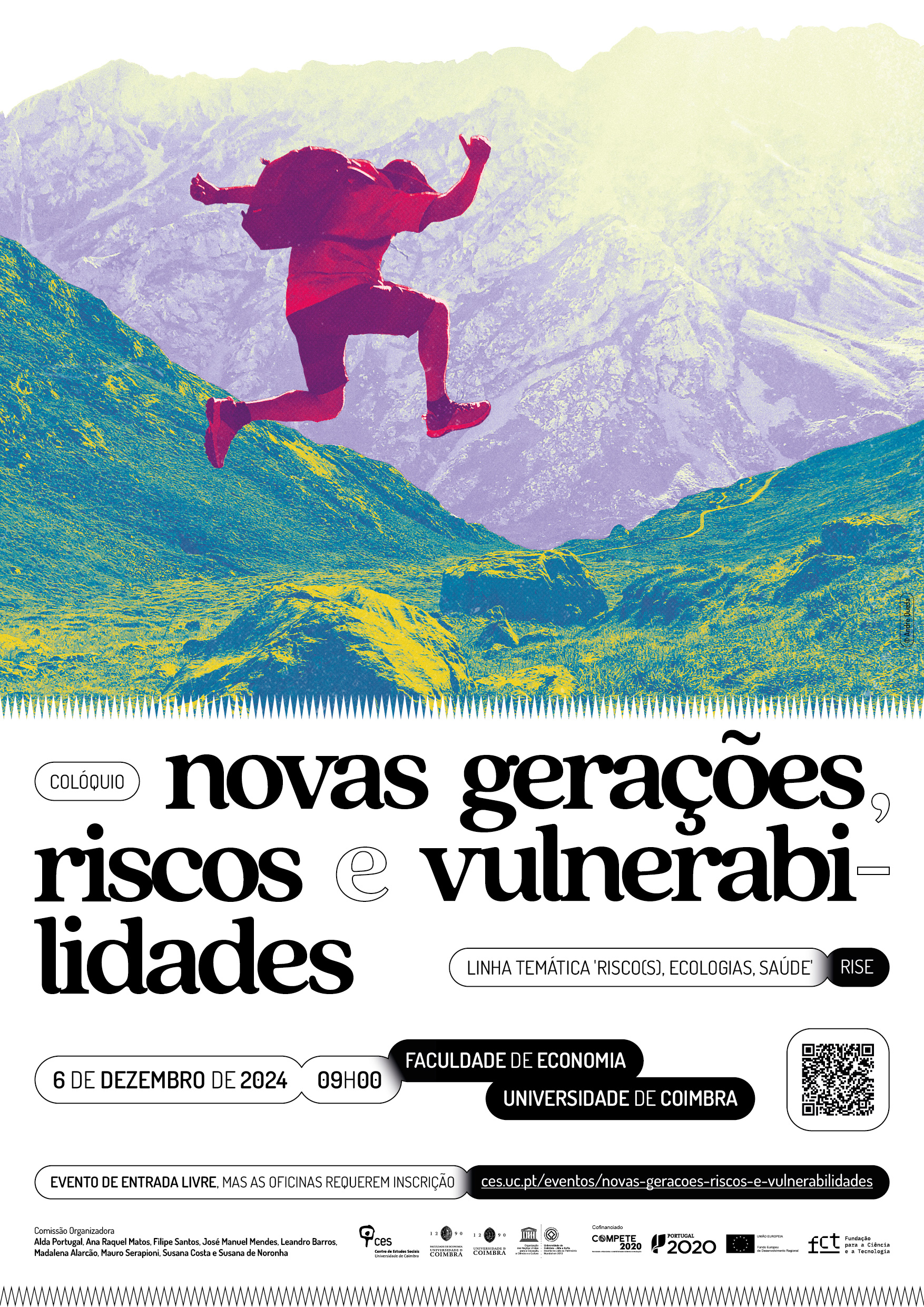Colloquium | Research Group 'Risk(s), Ecologies, Health' (RISE)
New generations, risks and vulnerabilities
December 6, 2024, 9h00-17h00
Faculty of Economics - UC
This event aims to promote a generational dialogue on the risks and vulnerabilities we face. The environment, climate change, health/illness, ageing, loneliness, racism, inequalities, vulnerability, violence, and technology are some of the themes to be addressed.
The plenary session will bring together different voices and generational experiences, ending with a poetry reading.
The RISE UP! photography exhibition will create a mural of expression and vindication about the risks and vulnerabilities that cross our bodies, communities and the places we inhabit.
Three thematic workshops will allow us to experience some of the challenges facing today's environmental and psychosocial risks.
The event is free to attend, but the workshops require prior registration as places are limited.
Programme
09h30 – Reception
09h45 - Welcome session - José Manuel Mendes (Director of FEUC) , Tiago Santos Pereira (Director of CES) and Susana Costa (CES)
10h00 - 12h00 - Plenary session (moderated by Madalena Alarcão)
Gabriela Fonseca (Instituto Superior Miguel Torga - ISMT, Coimbra)
José Daniel Vilhena (President of the DOCE Association)
José Machado (Association leader, DG-AAC European Policy coordinator)
Leonor Silva (Master's student in Sociology, Faculty of Economics, University of Coimbra)
12h30 - 12h40 – Debate
12h40 - 13h00 - Poetry Reading
Mental Health and Poetry, Mattia Faustini
Discrimination and Racism, Gabriela do Amaral
Environment, Susana de Noronha
Lunch break
14h00 - 14h30 - RISE UP - Photography exhibition with guided tour (Susana de Noronha, Alda Portugal and Ana Raquel Matos)
14h40 - 17h00 - Workshops
Workshop 1 - Reshape, facilitated by Marco Henriques, Carla Santiago, Catarina Medeiros (Auditorium)
Reshape’s mission is to guarantee the dignified reintegration of all people who are or have been imprisoned. Because it believes in second chances for both the raw materials and the people who produce them, it creates unique ceramic pieces by people who are serving or have served custodial sentences. These workshops favour small groups where, at the same time as pieces are being produced, there is talk about crime, justice and social integration.
Workshop 2 – “Syntropy and Regeneration through Use”, Terra Sintrópica, facilitated by Pedro Nogueira (outdoor space - Atrium of FEUC’s Multipurpose Room)
It is possible to produce and regenerate simultaneously. It is possible to promote agriculture that comes close to the structure and function of natural ecosystems, baring the forest as a model. It is possible to create systems capable of rebuilding soil fertility, preventing erosion, using water rationally and efficiently, contributing to the maintenance of nutrients in the system, enhancing and conserving biological diversity, minimising the production of greenhouse gases and facilitating human adaptation to climate change, while at the same time regenerating the local socio-economic fabric, ensuring the hope and sense of purpose necessary for an effective agro-ecological transition.
In this activity, we will have the opportunity to learn more about syntropy and the proposal of ‘regeneration through use’ while at the same time implementing a biodiverse seedbed capable of promoting the quantity and quality of consolidated life in the alliance between soil regeneration and food production.
Workshop 3 - I’m/Perfect: (im)perfect bodies. Forms of discrimination based on aesthetic reasons, facilitated by Chiara Pussetti, ICS, Lisbon (Keynes Room)
With the support of image projections, group activities and a short documentary, we will address issues related to body shaming dynamics and other forms of discrimination based on aesthetic appearance (lookism), which include, among others, ableism, ageism and fatphobia.
We will reflect on the social hierarchies that are created based on appearance, exploring the hegemonic ideals of beauty in Euro-American society, through an intersectional analysis that shows how the biopolitics of beauty are intertwined with social variables such as gender, sexual orientation, class, age, race/ethnicity and (in)ability.
Organising Committee | Alda Portugal, Ana Raquel Matos, Filipe Santos, José Manuel Mendes, Leandro Barros, Madalena Alarcão, Mauro Serapioni, Susana Costa and Susana de Noronha


